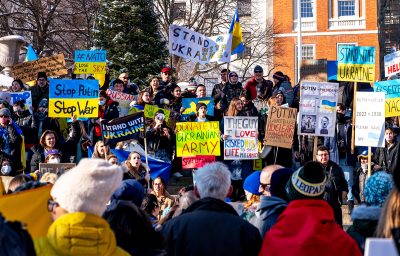
A sea of blue and yellow filled the streets of downtown Boston Sunday as hundreds showed up to protest Russia’s invasion of Ukraine.
The mass demonstration saw people waving the Ukrainian flag along with posters and banners in solidarity with the besieged nation.
At its core was Diana Zlotnikova, a Ukrainian woman and senior at Northeastern University, who organized the event and gave an impassioned speech right before the group of supporters began marching.
Battling tears and emotional stress, she urged those around her to “march today for peace.”
“We’ve come together today to show our love,” said Zlotnikova. “Love for our nation, and the heroes who are giving their lives to defend it.”
Zlotnikova’s family is currently embroiled in the conflict, taking refuge in a bomb shelter three hours from Kyiv.
On Feb. 24, Russia launched a large-scale invasion of Ukraine, displacing thousands of people in the country and inviting hefty sanctions from NATO countries, including the United States. On Sunday, before the Boston march took place, President Vladimir Putin put nuclear forces on high alert.
Despite an attempt at negotiations from both sides at the Belarusian border, Olga Tatashin, a Ukrainian woman from Crimea, said the danger is real.
“Trust Putin,” Tatashin said. “He’s a liar, he’s always lied. But I trust him in this because he said he will kill us, and we have to trust him this time.”
Supporters sang songs, clapped hands and chanted as they filed out of a snowy Boston Public Garden, the march’s initial meeting spot.
“Slava Ukraini,” a Ukrainian phrase that means “Glory to Ukraine,” was one of several cries heard throughout the day.
The march continued onto Newbury and Boylston Street where the parade was led by a group of supporters carrying a massive heart-shaped sculpture made of yellow and blue balloons.
“We feel we want to support our friends in Ukraine, and we feel powerless,” said Aleksey Yeremenko, a Ukrainian man who was part of the team hoisting the balloons.
Mark Vuntsev, a Russian-born supporter of Ukraine helping keep the heart-shaped sculpture raised, said what Russia is doing is “an atrocity.”
“My family’s all from [Ukraine], they’re struggling but they’re resisting,” Vuntsev said. “Ukrainians are amazing.”
A Russian student and a senior in the Boston University Questrom School of Business, who chose to remain anonymous out of fear of repercussion, said Ukraine and Russia are countries that share history, culture and heritage.
“Ukraine is our brother nation,” she said.
A woman from Belarus, who was draped in the Belarusian opposition flag in protest of Lukashenko’s ties with Russia, said although her country is closely allied with Putin, she feels an obligation to speak for those in her country and in Russia who cannot.
“The problem I have is, and I think Russians also experienced this as well, where, for so many years, they’ve been under a domestic oppressor, that even if they wanted to go out like we are right now, they might lose their job, their income, their life,” she told The Daily Free Press under the condition of anonymity due to fear of retaliation from the Belarusian government.
Oleksandr Litus, a Ukrainian student at Northeastern University, said his family is hiding out in Kyiv as fighting rages around them.
“They’re scared, and the only thing right now that helps them is the meeting we’re doing here,” he said. “They are watching the news and they’re watching the whole world support them, and it helps them a lot.”
Dan Kidd, a Czechoslovakian-born supporter from Maine who drove three hours to march, said Putin is to blame for the war — not the Russian people.
“People are the same everywhere in the world,” Kidd said. “I’d like to get the Russian people to depose Putin.”
With tears in his eyes, Kidd expressed concern that people will fail to remember what the world went through during the time of The Iron Curtain and the Soviet Union, which he lived through.
“It was pretty awful,” Kidd said. “You get a new generation and you forget.”
Correction: An earlier version of this story misquoted Diana Zlotnikova in paragraphs four and five. The article has been amended to include the correct quotation.























































































































Anonymous • Mar 1, 2022 at 12:11 pm
Well done, students!